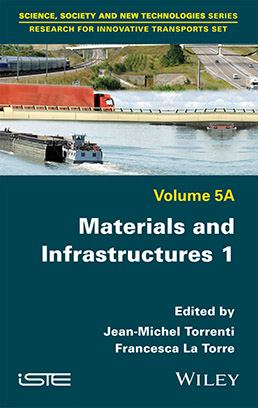
This volume presents the first half of a diverse collection of chapters in the field of materials and infrastructures in transport systems, which illustrate the technological and methodological innovations required to rise to the challenge of building more sustainable transport infrastructures for the future.
The authors explore the potential of these sustainable solutions to improve the performance and efficiency of materials and infrastructures, with a reduced environmental impact and lower cost. Theoretical and practical case studies address a variety of topics including circular economy and sustainability, the impacts of climate change, durability, lifecycle, auscultation and the monitoring of infrastructures.
This book provides transport researchers and professionals with a better understanding of the current and future trends in these innovative fields, enabling them to put into practice new technologies and methods of design and management, so that new solutions can become current practices to truly improve modern transport systems.
Part 1. Materials for Infrastructures.
1. Use of an Ultra-wide Band Radar to Detect Slope Movements Along Transport Infrastructures, Jean-Pierre Magnan, Jean-Paul Duranthon, Patrick Joffrin, François Depardon, Dominique Allagnat, François Lemaître, Philippe Evenat and Philippe Le Ster.
2. Intelligent Compaction Technology for Geomaterials: A Demonstration Project, António Gomes Correia and Manuel Parente.
3. Geotechnical Challenges Related to Transport Infrastructures on Sensitive Soft Clay Deposits,Vikas Thakur and Bjorn Kristoffer Dolva.
4. Performance Control of Bituminous Mixtures with a High RAP Content, Frédéric Delfosse, Ivan Drouadaine, Stéphane Faucon Dumont and Sabine Largeaud.
5. Integration of Materials Science- based Performance Models into PMS, Altred Weninger-Vycudil, Michael Wistuba, Goran Mladenovic, Johan Litzka, Axel Walther and Alexander Alisov.
6. Decision Aid Model for Asphalt Mixture Choice, Nicolas Bueche and André-Gilles Dumont.
7. Experimental Study of Binder–Filler Interaction Using the Modified Multiple Stress–Strain Creep Recovery Test, Mahmoud Elnasri, Nick Thom and Gordon Airey.
8. Reliability of New Shear Design Equations for FRP-strengthened Concrete Bridge Girders, Ayman M. Okeil, Abdeldjelil Belarbi and Daniel A. Kuchma.
9. Experimental Investigation and Modeling of the Bond between Aramid Fiber-reinforced Polymer Bars and Concrete, Arnaud Rolland, Sylvain Chataigner, Karim Benzarti, Marc Quiertant, Pierre Argoul and Jean-Marc Paul.
10. Innovative Use of FRP for Sustainable Precast Concrete Structures, Sami Rizkalla.
Part 2. Auscultation and Monitoring.
11. 3D Extraction of the Relief of Road Surface through Image Analysis, Majdi Khoudeir and Benjamin Bringier.
12. Measurement Error Models (MEMs) Regression Method to Harmonize Friction Values from Different Skid Testing Devices, Azzurra Evangelisti, Samer W. Katicha, Edgar De León Izeppi, Gerardo W. Flintsch, Mauro D’apuzzo and Vittorio Nicolosi.
13. Accurate and Up-to-Date Evaluation of Extreme Load Effects for Bridge Assessment, Xiaoyi Zhou, Franziska Schmidt, François Toutlemonde and Bernard Jacob.
14. Transportation Infrastructure Monitoring Using Satellite Remote Sensing, Edward Hoppe, Brian Bruckno, Elizabeth Campbell, Scott Acton, Andrea Vaccari, Michael Stuecheli, Adrian Bohane, Giacomo Falorni and Jessica Morgan.
15. Monitoring of Scour Critical Bridges using Changes in the Natural Frequency of Vibration of Foundation Piles: A Preliminary Investigation, Luke J. Prendergast and Kenneth Gavin.
16. Evaluation of Multilayer Pavement Viscoelastic Properties from Falling Weight Deflectometer using Neural Networks, José Manuel Gonzalez, Josep Maria Carbonell and Wouter Van Bijsterveld.
17. Accuracy of Ground-penetrating Radar in Pavement Thickness Evaluation: Impact of Interpretation Errors, Anne Lalagüe, Matthew A. Lebens and Inge Hoff.
18. Full-scale Test on Prefabricated Slabs for Electrical Supply by Induction of Urban Transport Systems, Mai-Lan Nguyen, Pierre Hornych, Jean-Pierre Kerzrého and Sergio Perez.
Part 3. Durability and Maintenance Repair.
19. The Poroelastic Road Surface (PERS): Is the 10 dB Reducing Pavement within Reach? Luc Goubert, Hans Bendtsen, Anneleen Bergiers, Björn Kalman and Darko Kokot.
20. Modeling Subjective Condition Data of Asphalt Surfaced Urban Pavements, Rayya Hassan, Oliver Lin and Amutha Thananjeyan.
21. Modeling of Aging of Low-noise Road Surfaces, Gijsjan Van Blokland, Ronald Van Loon and Christiaan Tollenaar.
22. Evaluation of Load-carrying Capacity of Asphalt Superstructures from Deflection Measurements, J. Stefan Bald and Anh-Duc Nguyen.
23. Durable Pothole Repairs, Cliff Nicholls, Kathrin Kubanek, Carsten Karcher, Andreas Hartmann, Adewole Adesiyun, Aleksander Ipavec, Jozef Komaka and Erik Nielsen.
24. Application of Multicriteria Assessment for the Selection of At-grade Intersections, Jan Hradil, Michal Uhlík and Petr Slabý.
25. Low-energy and Environmentally-friendly Solutions for Road Maintenance, Bernard Eckmann, Frédéric Delfosse, Philippe Poilane and Bruno Taillis.
26. 3D Longitudinal and Transverse Cracking and the Influence of Non-Uniform Contact Pressure on the Stress Intensity Factors of these Cracks, Dermot B. Casey, James R. Grenfell and Gordon Airey.
27. Selecting a Road Network Maintenance Strategy to Achieve the Operator’s Objectives, Pierre Hankach and Philippe Lepert.
Jean-Michel Torrenti is the R&D director of the Materials and Structures Department of IFSTTAR, and a Professor at Ecole Nationale des Ponts et Chaussées. His research concerns the mechanics of concrete and its coupling with durability aspects, and has been applied to modeling the behavior of structures such as bridges, nuclear power plants and nuclear waste storage. He is the co-author of several books concerning concrete and concrete structures.
Francesca La Torre is Professor of roads, railways and airports at the University of Florence in Italy. She has been working in the field of transportation infrastructures for over 20 years, and is a member of the EC Horizon 2020 advisory group for “Smart, Green and Integrated Transport” and the infrastructures representative for academia in ERTRAC.
Set Coordiantor: Bernard Jacob, chair of the Programme Committee of TRA2014, is deputy scientific director for transport, infrastructures and safety with IFSTTAR. His research works are in bridge and road safety, traffic loads on bridges, heavy vehicles and weigh-in-motion. He is Professor at Ecole Nationale des Travaux Publics de l’Etat in France, and President of the International Society for WIM (ISWIM).